Challenges of Sociocultural Approach in Early Childhood Education
VerifiedAdded on 2023/06/03
|19
|5379
|384
Essay
AI Summary
This essay explores the challenges encountered by educators when implementing a sociocultural learning approach in early childhood education, drawing upon Brennan's (2007) observations. It discusses the theoretical underpinnings of sociocultural learning as opposed to constructivist approaches, highlighting the importance of social interaction and cultural context in children's development. The essay examines pedagogical approaches, the role of transition programs, and policy development in either facilitating or hindering the effective implementation of sociocultural practices. Furthermore, it emphasizes the significance of collective professional development and collaborative curriculum development to overcome these challenges and foster a community of learning that supports children's holistic development and ensures continuity between early childhood services and primary schools.
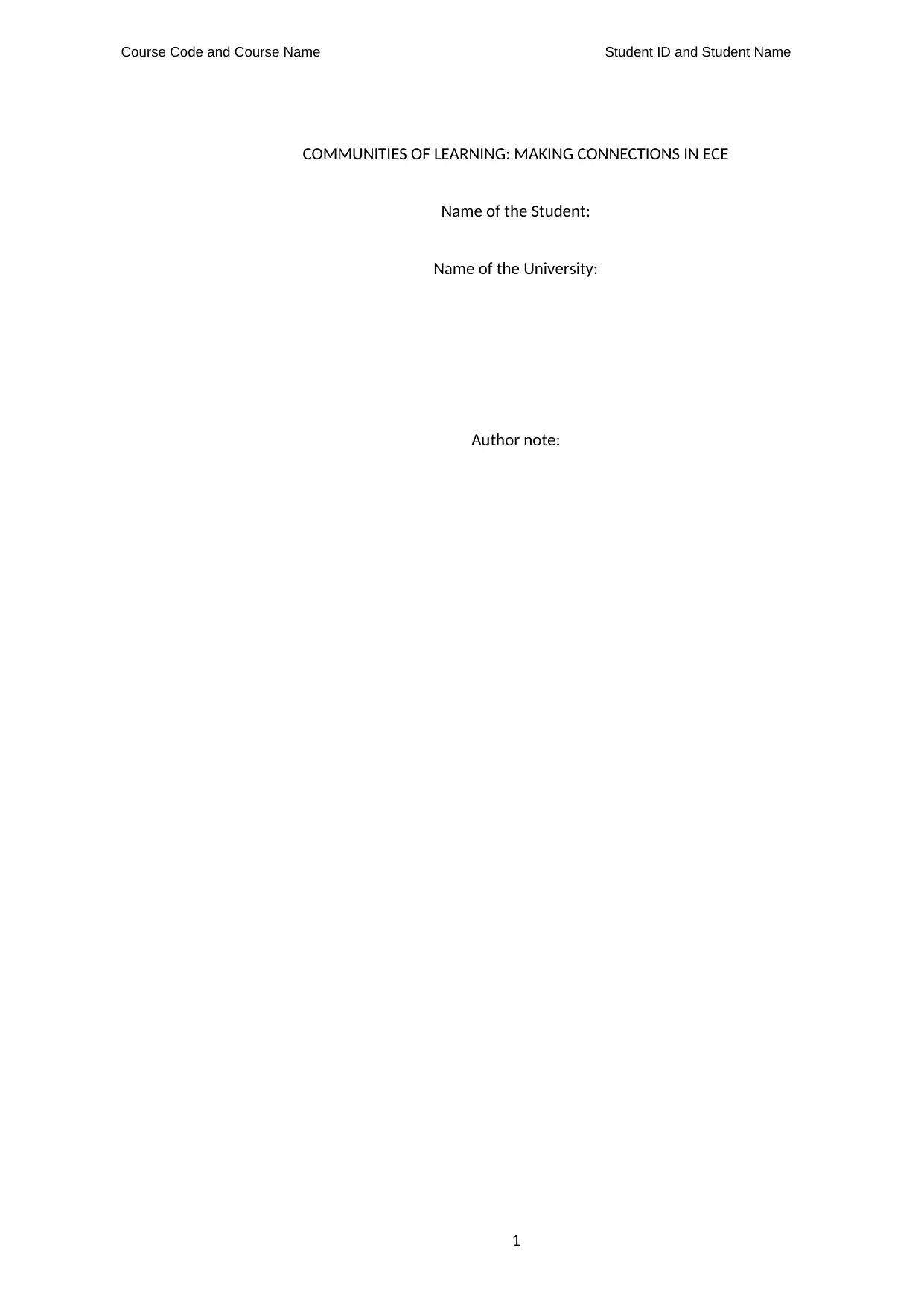
Course Code and Course Name Student ID and Student Name
COMMUNITIES OF LEARNING: MAKING CONNECTIONS IN ECE
Name of the Student:
Name of the University:
Author note:
1
COMMUNITIES OF LEARNING: MAKING CONNECTIONS IN ECE
Name of the Student:
Name of the University:
Author note:
1
Paraphrase This Document
Need a fresh take? Get an instant paraphrase of this document with our AI Paraphraser
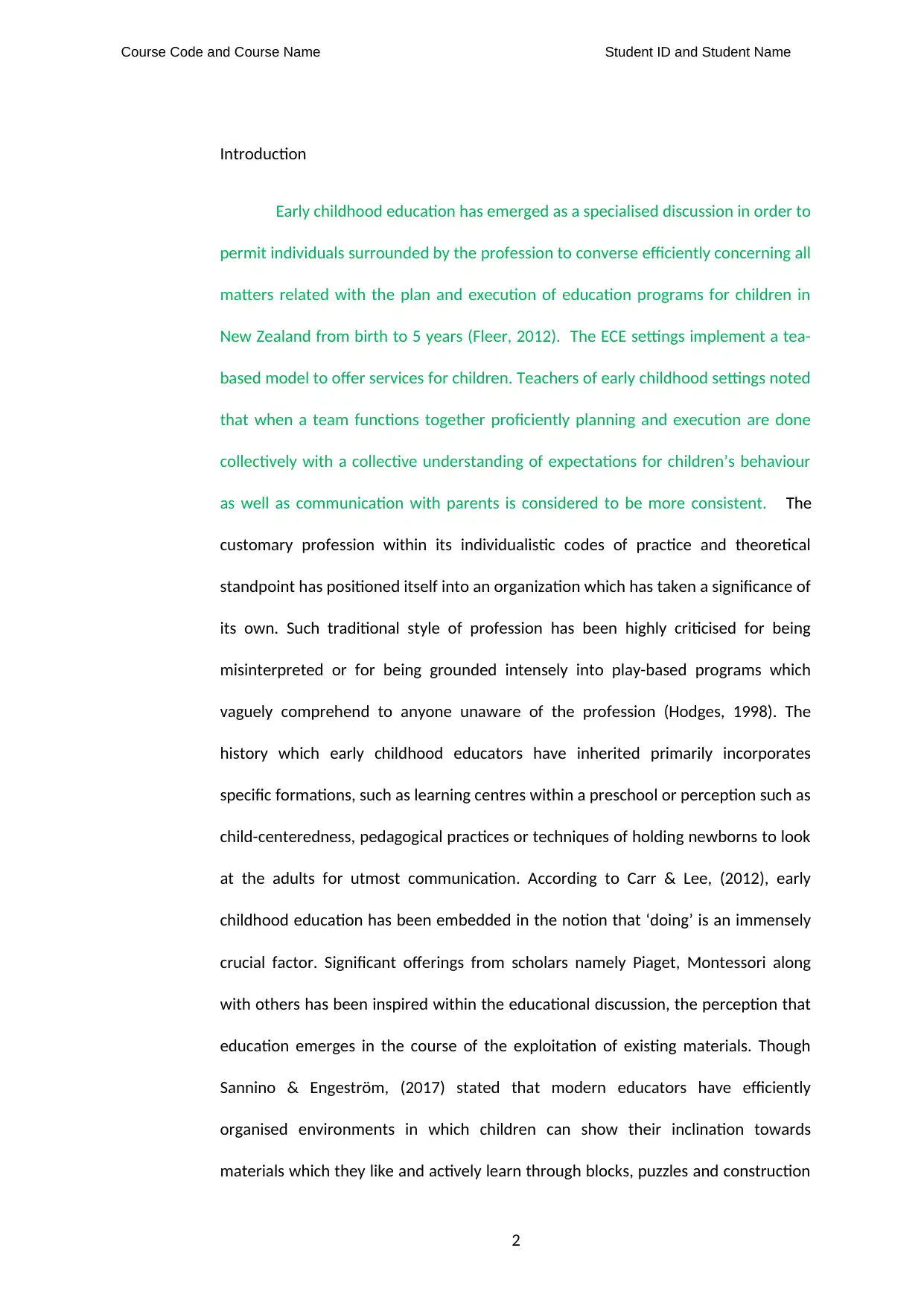
Course Code and Course Name Student ID and Student Name
Introduction
Early childhood education has emerged as a specialised discussion in order to
permit individuals surrounded by the profession to converse efficiently concerning all
matters related with the plan and execution of education programs for children in
New Zealand from birth to 5 years (Fleer, 2012). The ECE settings implement a tea-
based model to offer services for children. Teachers of early childhood settings noted
that when a team functions together proficiently planning and execution are done
collectively with a collective understanding of expectations for children’s behaviour
as well as communication with parents is considered to be more consistent. The
customary profession within its individualistic codes of practice and theoretical
standpoint has positioned itself into an organization which has taken a significance of
its own. Such traditional style of profession has been highly criticised for being
misinterpreted or for being grounded intensely into play-based programs which
vaguely comprehend to anyone unaware of the profession (Hodges, 1998). The
history which early childhood educators have inherited primarily incorporates
specific formations, such as learning centres within a preschool or perception such as
child-centeredness, pedagogical practices or techniques of holding newborns to look
at the adults for utmost communication. According to Carr & Lee, (2012), early
childhood education has been embedded in the notion that ‘doing’ is an immensely
crucial factor. Significant offerings from scholars namely Piaget, Montessori along
with others has been inspired within the educational discussion, the perception that
education emerges in the course of the exploitation of existing materials. Though
Sannino & Engeström, (2017) stated that modern educators have efficiently
organised environments in which children can show their inclination towards
materials which they like and actively learn through blocks, puzzles and construction
2
Introduction
Early childhood education has emerged as a specialised discussion in order to
permit individuals surrounded by the profession to converse efficiently concerning all
matters related with the plan and execution of education programs for children in
New Zealand from birth to 5 years (Fleer, 2012). The ECE settings implement a tea-
based model to offer services for children. Teachers of early childhood settings noted
that when a team functions together proficiently planning and execution are done
collectively with a collective understanding of expectations for children’s behaviour
as well as communication with parents is considered to be more consistent. The
customary profession within its individualistic codes of practice and theoretical
standpoint has positioned itself into an organization which has taken a significance of
its own. Such traditional style of profession has been highly criticised for being
misinterpreted or for being grounded intensely into play-based programs which
vaguely comprehend to anyone unaware of the profession (Hodges, 1998). The
history which early childhood educators have inherited primarily incorporates
specific formations, such as learning centres within a preschool or perception such as
child-centeredness, pedagogical practices or techniques of holding newborns to look
at the adults for utmost communication. According to Carr & Lee, (2012), early
childhood education has been embedded in the notion that ‘doing’ is an immensely
crucial factor. Significant offerings from scholars namely Piaget, Montessori along
with others has been inspired within the educational discussion, the perception that
education emerges in the course of the exploitation of existing materials. Though
Sannino & Engeström, (2017) stated that modern educators have efficiently
organised environments in which children can show their inclination towards
materials which they like and actively learn through blocks, puzzles and construction
2
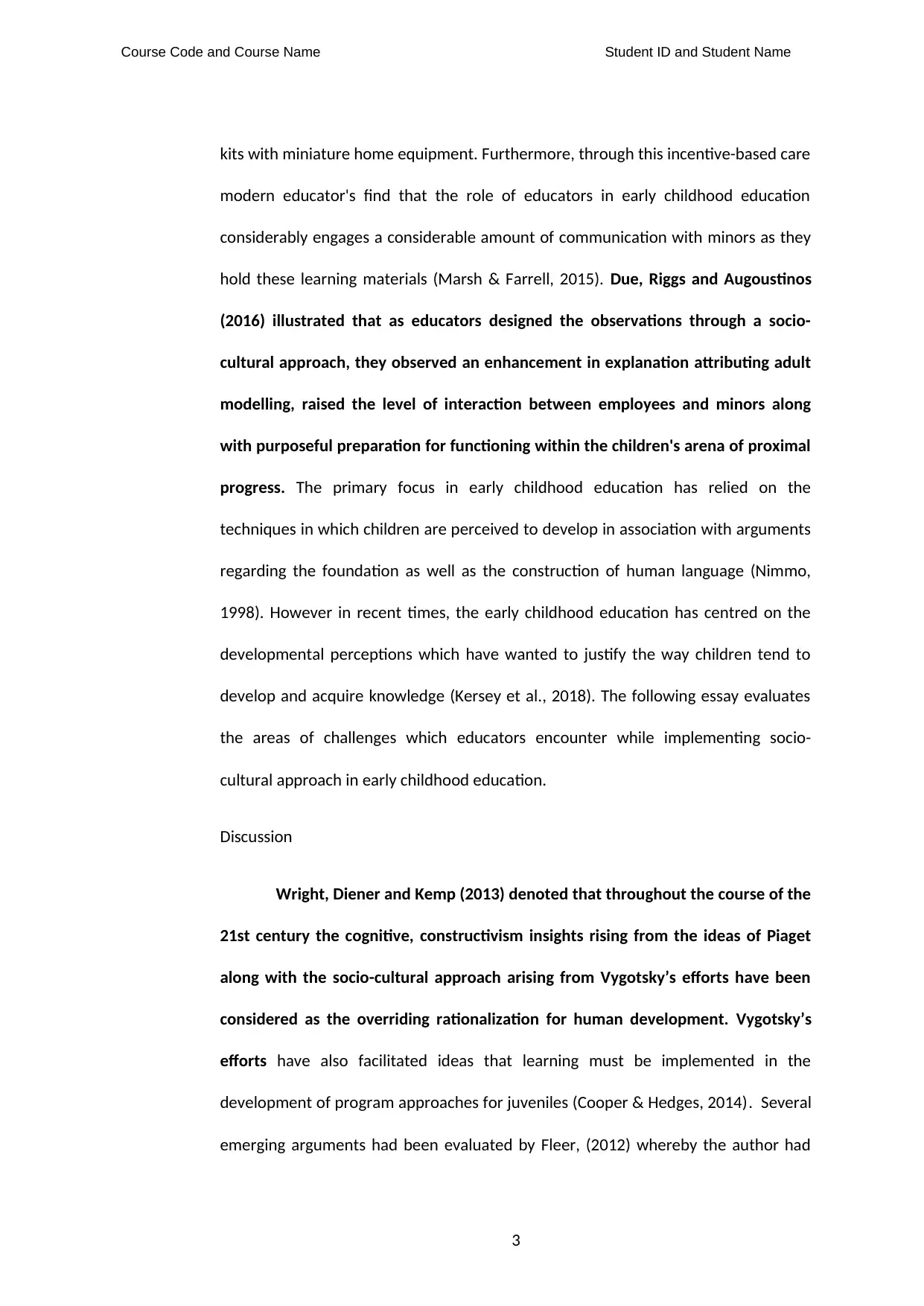
Course Code and Course Name Student ID and Student Name
kits with miniature home equipment. Furthermore, through this incentive-based care
modern educator's find that the role of educators in early childhood education
considerably engages a considerable amount of communication with minors as they
hold these learning materials (Marsh & Farrell, 2015). Due, Riggs and Augoustinos
(2016) illustrated that as educators designed the observations through a socio-
cultural approach, they observed an enhancement in explanation attributing adult
modelling, raised the level of interaction between employees and minors along
with purposeful preparation for functioning within the children's arena of proximal
progress. The primary focus in early childhood education has relied on the
techniques in which children are perceived to develop in association with arguments
regarding the foundation as well as the construction of human language (Nimmo,
1998). However in recent times, the early childhood education has centred on the
developmental perceptions which have wanted to justify the way children tend to
develop and acquire knowledge (Kersey et al., 2018). The following essay evaluates
the areas of challenges which educators encounter while implementing socio-
cultural approach in early childhood education.
Discussion
Wright, Diener and Kemp (2013) denoted that throughout the course of the
21st century the cognitive, constructivism insights rising from the ideas of Piaget
along with the socio-cultural approach arising from Vygotsky’s efforts have been
considered as the overriding rationalization for human development. Vygotsky’s
efforts have also facilitated ideas that learning must be implemented in the
development of program approaches for juveniles (Cooper & Hedges, 2014). Several
emerging arguments had been evaluated by Fleer, (2012) whereby the author had
3
kits with miniature home equipment. Furthermore, through this incentive-based care
modern educator's find that the role of educators in early childhood education
considerably engages a considerable amount of communication with minors as they
hold these learning materials (Marsh & Farrell, 2015). Due, Riggs and Augoustinos
(2016) illustrated that as educators designed the observations through a socio-
cultural approach, they observed an enhancement in explanation attributing adult
modelling, raised the level of interaction between employees and minors along
with purposeful preparation for functioning within the children's arena of proximal
progress. The primary focus in early childhood education has relied on the
techniques in which children are perceived to develop in association with arguments
regarding the foundation as well as the construction of human language (Nimmo,
1998). However in recent times, the early childhood education has centred on the
developmental perceptions which have wanted to justify the way children tend to
develop and acquire knowledge (Kersey et al., 2018). The following essay evaluates
the areas of challenges which educators encounter while implementing socio-
cultural approach in early childhood education.
Discussion
Wright, Diener and Kemp (2013) denoted that throughout the course of the
21st century the cognitive, constructivism insights rising from the ideas of Piaget
along with the socio-cultural approach arising from Vygotsky’s efforts have been
considered as the overriding rationalization for human development. Vygotsky’s
efforts have also facilitated ideas that learning must be implemented in the
development of program approaches for juveniles (Cooper & Hedges, 2014). Several
emerging arguments had been evaluated by Fleer, (2012) whereby the author had
3
⊘ This is a preview!⊘
Do you want full access?
Subscribe today to unlock all pages.

Trusted by 1+ million students worldwide
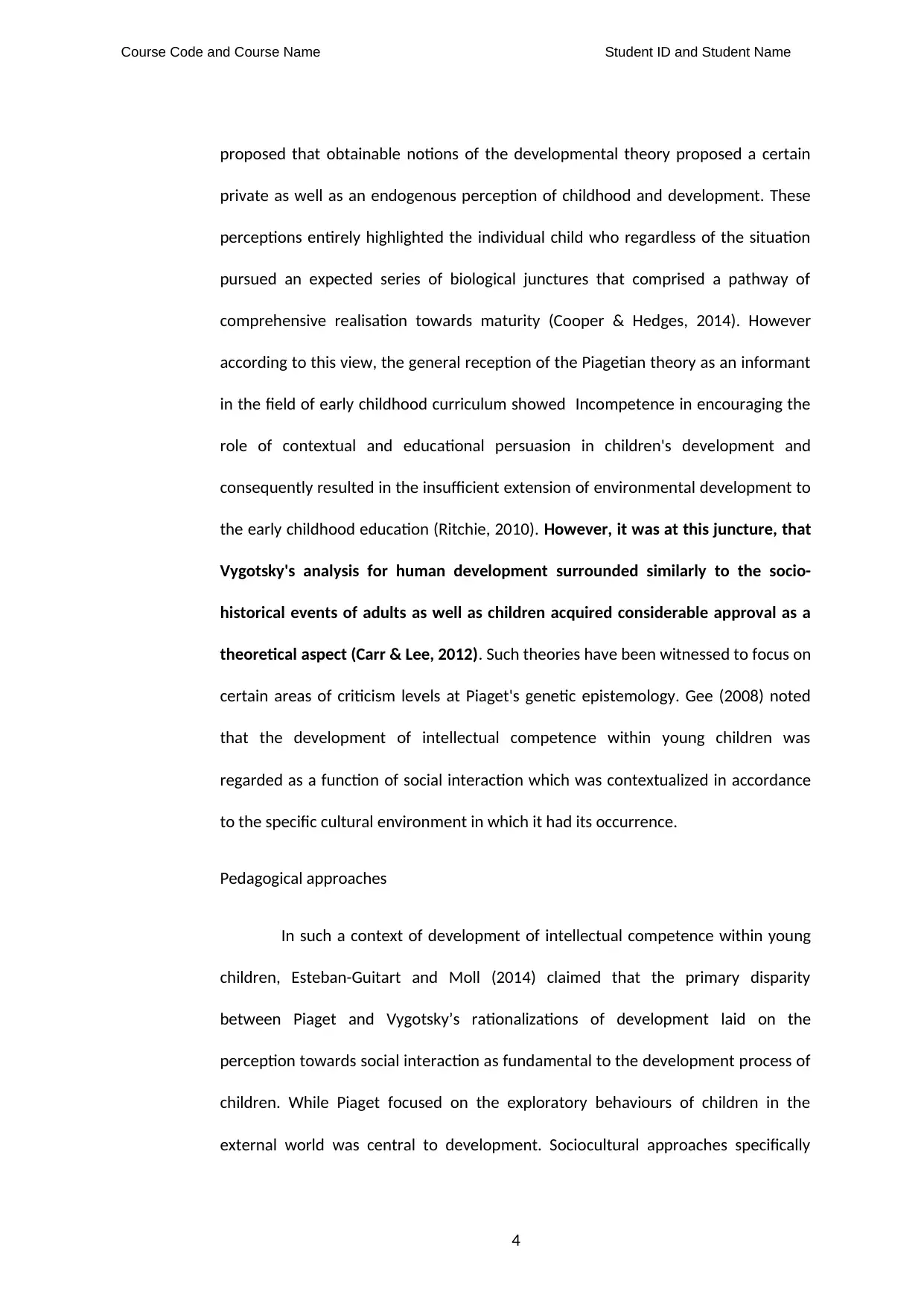
Course Code and Course Name Student ID and Student Name
proposed that obtainable notions of the developmental theory proposed a certain
private as well as an endogenous perception of childhood and development. These
perceptions entirely highlighted the individual child who regardless of the situation
pursued an expected series of biological junctures that comprised a pathway of
comprehensive realisation towards maturity (Cooper & Hedges, 2014). However
according to this view, the general reception of the Piagetian theory as an informant
in the field of early childhood curriculum showed Incompetence in encouraging the
role of contextual and educational persuasion in children's development and
consequently resulted in the insufficient extension of environmental development to
the early childhood education (Ritchie, 2010). However, it was at this juncture, that
Vygotsky's analysis for human development surrounded similarly to the socio-
historical events of adults as well as children acquired considerable approval as a
theoretical aspect (Carr & Lee, 2012). Such theories have been witnessed to focus on
certain areas of criticism levels at Piaget's genetic epistemology. Gee (2008) noted
that the development of intellectual competence within young children was
regarded as a function of social interaction which was contextualized in accordance
to the specific cultural environment in which it had its occurrence.
Pedagogical approaches
In such a context of development of intellectual competence within young
children, Esteban-Guitart and Moll (2014) claimed that the primary disparity
between Piaget and Vygotsky’s rationalizations of development laid on the
perception towards social interaction as fundamental to the development process of
children. While Piaget focused on the exploratory behaviours of children in the
external world was central to development. Sociocultural approaches specifically
4
proposed that obtainable notions of the developmental theory proposed a certain
private as well as an endogenous perception of childhood and development. These
perceptions entirely highlighted the individual child who regardless of the situation
pursued an expected series of biological junctures that comprised a pathway of
comprehensive realisation towards maturity (Cooper & Hedges, 2014). However
according to this view, the general reception of the Piagetian theory as an informant
in the field of early childhood curriculum showed Incompetence in encouraging the
role of contextual and educational persuasion in children's development and
consequently resulted in the insufficient extension of environmental development to
the early childhood education (Ritchie, 2010). However, it was at this juncture, that
Vygotsky's analysis for human development surrounded similarly to the socio-
historical events of adults as well as children acquired considerable approval as a
theoretical aspect (Carr & Lee, 2012). Such theories have been witnessed to focus on
certain areas of criticism levels at Piaget's genetic epistemology. Gee (2008) noted
that the development of intellectual competence within young children was
regarded as a function of social interaction which was contextualized in accordance
to the specific cultural environment in which it had its occurrence.
Pedagogical approaches
In such a context of development of intellectual competence within young
children, Esteban-Guitart and Moll (2014) claimed that the primary disparity
between Piaget and Vygotsky’s rationalizations of development laid on the
perception towards social interaction as fundamental to the development process of
children. While Piaget focused on the exploratory behaviours of children in the
external world was central to development. Sociocultural approaches specifically
4
Paraphrase This Document
Need a fresh take? Get an instant paraphrase of this document with our AI Paraphraser
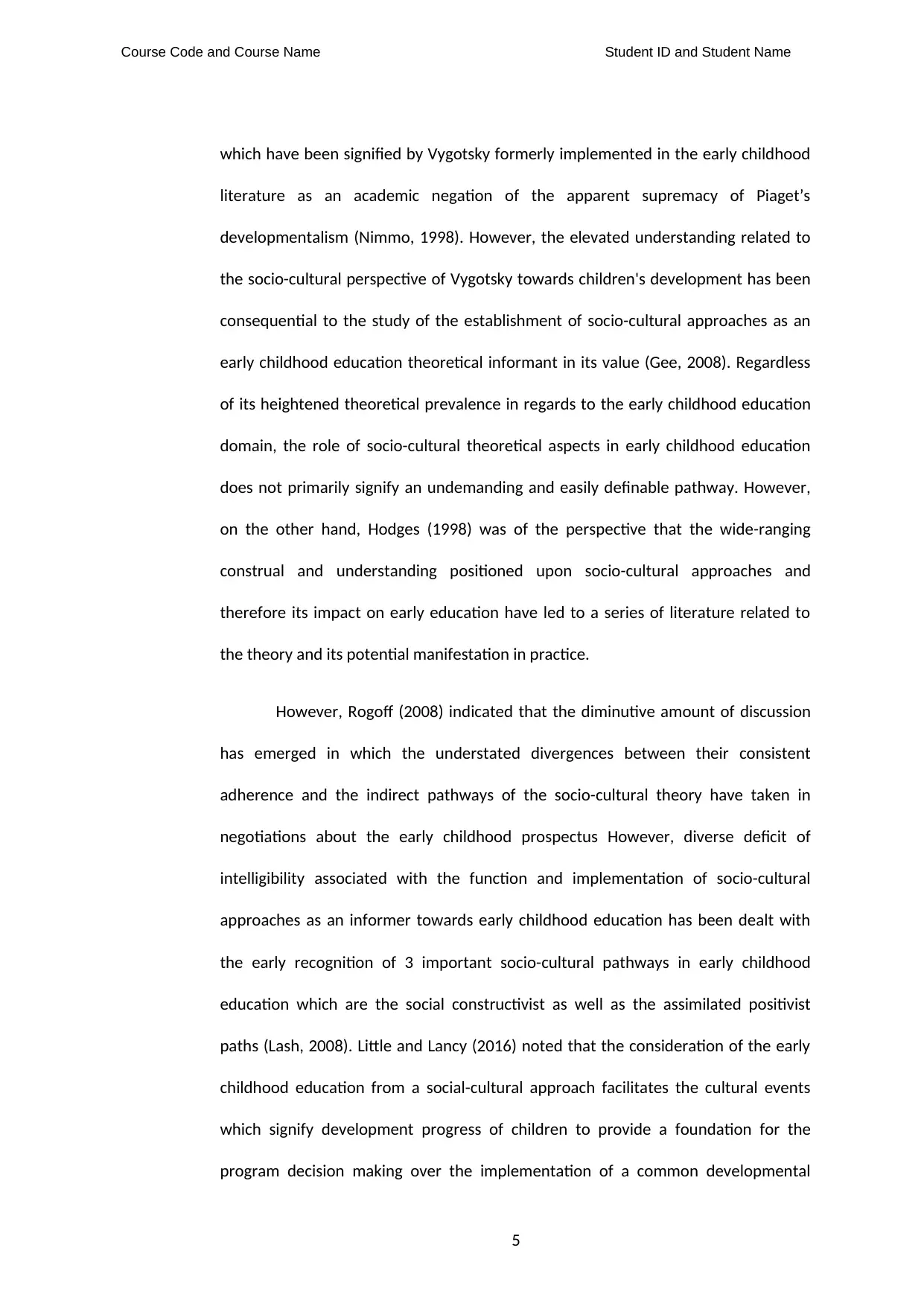
Course Code and Course Name Student ID and Student Name
which have been signified by Vygotsky formerly implemented in the early childhood
literature as an academic negation of the apparent supremacy of Piaget’s
developmentalism (Nimmo, 1998). However, the elevated understanding related to
the socio-cultural perspective of Vygotsky towards children's development has been
consequential to the study of the establishment of socio-cultural approaches as an
early childhood education theoretical informant in its value (Gee, 2008). Regardless
of its heightened theoretical prevalence in regards to the early childhood education
domain, the role of socio-cultural theoretical aspects in early childhood education
does not primarily signify an undemanding and easily definable pathway. However,
on the other hand, Hodges (1998) was of the perspective that the wide-ranging
construal and understanding positioned upon socio-cultural approaches and
therefore its impact on early education have led to a series of literature related to
the theory and its potential manifestation in practice.
However, Rogoff (2008) indicated that the diminutive amount of discussion
has emerged in which the understated divergences between their consistent
adherence and the indirect pathways of the socio-cultural theory have taken in
negotiations about the early childhood prospectus However, diverse deficit of
intelligibility associated with the function and implementation of socio-cultural
approaches as an informer towards early childhood education has been dealt with
the early recognition of 3 important socio-cultural pathways in early childhood
education which are the social constructivist as well as the assimilated positivist
paths (Lash, 2008). Little and Lancy (2016) noted that the consideration of the early
childhood education from a social-cultural approach facilitates the cultural events
which signify development progress of children to provide a foundation for the
program decision making over the implementation of a common developmental
5
which have been signified by Vygotsky formerly implemented in the early childhood
literature as an academic negation of the apparent supremacy of Piaget’s
developmentalism (Nimmo, 1998). However, the elevated understanding related to
the socio-cultural perspective of Vygotsky towards children's development has been
consequential to the study of the establishment of socio-cultural approaches as an
early childhood education theoretical informant in its value (Gee, 2008). Regardless
of its heightened theoretical prevalence in regards to the early childhood education
domain, the role of socio-cultural theoretical aspects in early childhood education
does not primarily signify an undemanding and easily definable pathway. However,
on the other hand, Hodges (1998) was of the perspective that the wide-ranging
construal and understanding positioned upon socio-cultural approaches and
therefore its impact on early education have led to a series of literature related to
the theory and its potential manifestation in practice.
However, Rogoff (2008) indicated that the diminutive amount of discussion
has emerged in which the understated divergences between their consistent
adherence and the indirect pathways of the socio-cultural theory have taken in
negotiations about the early childhood prospectus However, diverse deficit of
intelligibility associated with the function and implementation of socio-cultural
approaches as an informer towards early childhood education has been dealt with
the early recognition of 3 important socio-cultural pathways in early childhood
education which are the social constructivist as well as the assimilated positivist
paths (Lash, 2008). Little and Lancy (2016) noted that the consideration of the early
childhood education from a social-cultural approach facilitates the cultural events
which signify development progress of children to provide a foundation for the
program decision making over the implementation of a common developmental
5
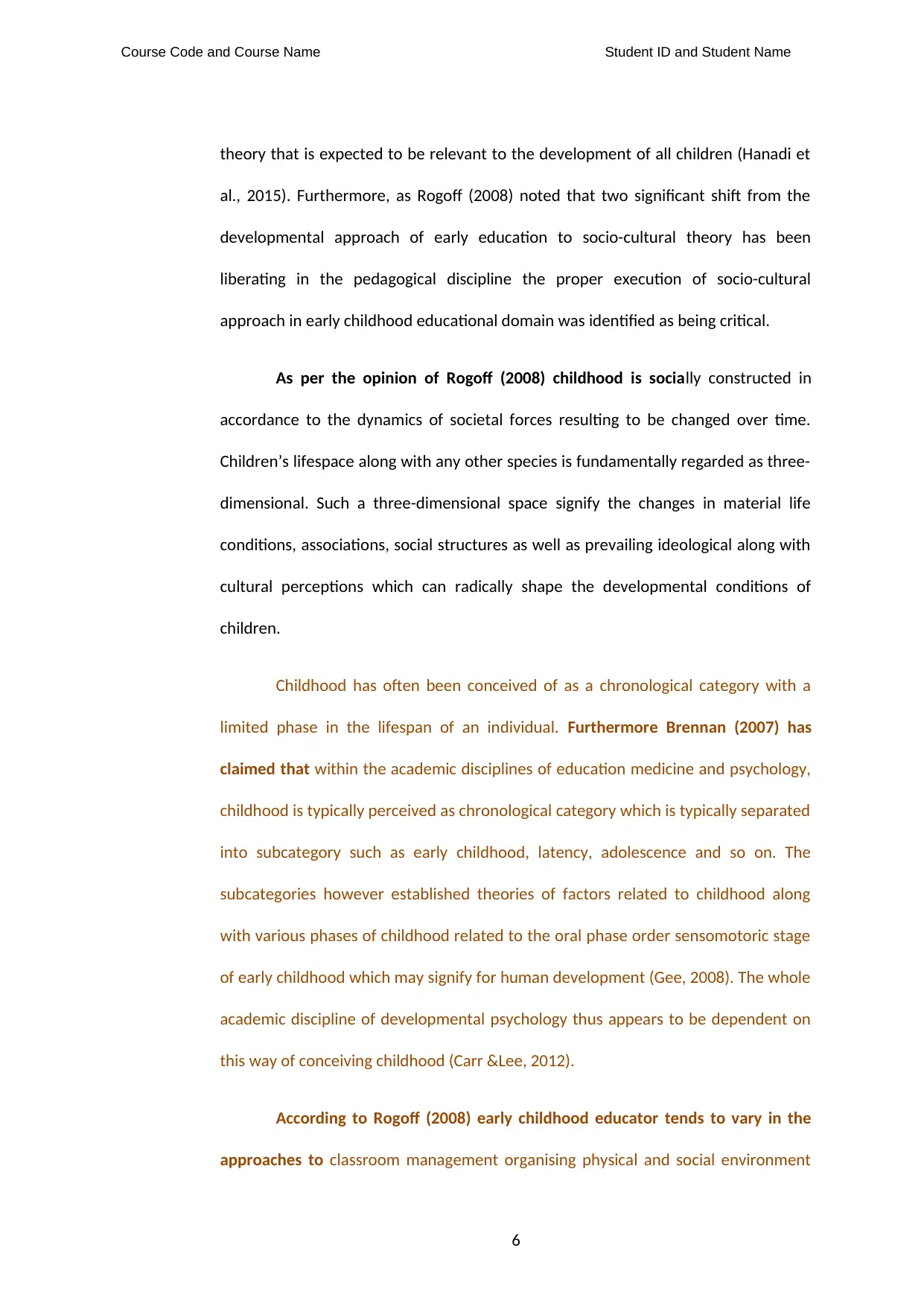
Course Code and Course Name Student ID and Student Name
theory that is expected to be relevant to the development of all children (Hanadi et
al., 2015). Furthermore, as Rogoff (2008) noted that two significant shift from the
developmental approach of early education to socio-cultural theory has been
liberating in the pedagogical discipline the proper execution of socio-cultural
approach in early childhood educational domain was identified as being critical.
As per the opinion of Rogoff (2008) childhood is socially constructed in
accordance to the dynamics of societal forces resulting to be changed over time.
Children’s lifespace along with any other species is fundamentally regarded as three-
dimensional. Such a three-dimensional space signify the changes in material life
conditions, associations, social structures as well as prevailing ideological along with
cultural perceptions which can radically shape the developmental conditions of
children.
Childhood has often been conceived of as a chronological category with a
limited phase in the lifespan of an individual. Furthermore Brennan (2007) has
claimed that within the academic disciplines of education medicine and psychology,
childhood is typically perceived as chronological category which is typically separated
into subcategory such as early childhood, latency, adolescence and so on. The
subcategories however established theories of factors related to childhood along
with various phases of childhood related to the oral phase order sensomotoric stage
of early childhood which may signify for human development (Gee, 2008). The whole
academic discipline of developmental psychology thus appears to be dependent on
this way of conceiving childhood (Carr &Lee, 2012).
According to Rogoff (2008) early childhood educator tends to vary in the
approaches to classroom management organising physical and social environment
6
theory that is expected to be relevant to the development of all children (Hanadi et
al., 2015). Furthermore, as Rogoff (2008) noted that two significant shift from the
developmental approach of early education to socio-cultural theory has been
liberating in the pedagogical discipline the proper execution of socio-cultural
approach in early childhood educational domain was identified as being critical.
As per the opinion of Rogoff (2008) childhood is socially constructed in
accordance to the dynamics of societal forces resulting to be changed over time.
Children’s lifespace along with any other species is fundamentally regarded as three-
dimensional. Such a three-dimensional space signify the changes in material life
conditions, associations, social structures as well as prevailing ideological along with
cultural perceptions which can radically shape the developmental conditions of
children.
Childhood has often been conceived of as a chronological category with a
limited phase in the lifespan of an individual. Furthermore Brennan (2007) has
claimed that within the academic disciplines of education medicine and psychology,
childhood is typically perceived as chronological category which is typically separated
into subcategory such as early childhood, latency, adolescence and so on. The
subcategories however established theories of factors related to childhood along
with various phases of childhood related to the oral phase order sensomotoric stage
of early childhood which may signify for human development (Gee, 2008). The whole
academic discipline of developmental psychology thus appears to be dependent on
this way of conceiving childhood (Carr &Lee, 2012).
According to Rogoff (2008) early childhood educator tends to vary in the
approaches to classroom management organising physical and social environment
6
⊘ This is a preview!⊘
Do you want full access?
Subscribe today to unlock all pages.

Trusted by 1+ million students worldwide
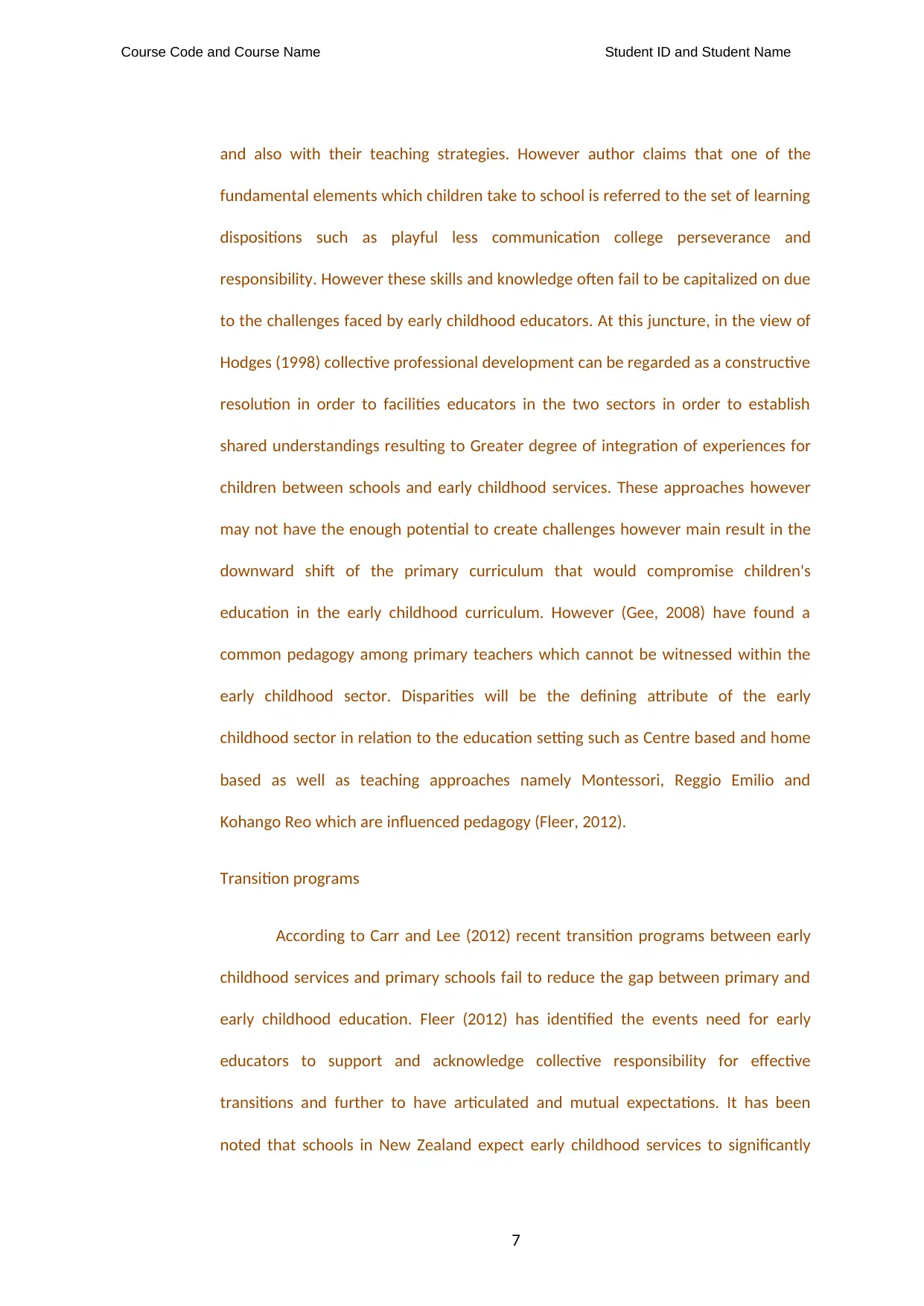
Course Code and Course Name Student ID and Student Name
and also with their teaching strategies. However author claims that one of the
fundamental elements which children take to school is referred to the set of learning
dispositions such as playful less communication college perseverance and
responsibility. However these skills and knowledge often fail to be capitalized on due
to the challenges faced by early childhood educators. At this juncture, in the view of
Hodges (1998) collective professional development can be regarded as a constructive
resolution in order to facilities educators in the two sectors in order to establish
shared understandings resulting to Greater degree of integration of experiences for
children between schools and early childhood services. These approaches however
may not have the enough potential to create challenges however main result in the
downward shift of the primary curriculum that would compromise children's
education in the early childhood curriculum. However (Gee, 2008) have found a
common pedagogy among primary teachers which cannot be witnessed within the
early childhood sector. Disparities will be the defining attribute of the early
childhood sector in relation to the education setting such as Centre based and home
based as well as teaching approaches namely Montessori, Reggio Emilio and
Kohango Reo which are influenced pedagogy (Fleer, 2012).
Transition programs
According to Carr and Lee (2012) recent transition programs between early
childhood services and primary schools fail to reduce the gap between primary and
early childhood education. Fleer (2012) has identified the events need for early
educators to support and acknowledge collective responsibility for effective
transitions and further to have articulated and mutual expectations. It has been
noted that schools in New Zealand expect early childhood services to significantly
7
and also with their teaching strategies. However author claims that one of the
fundamental elements which children take to school is referred to the set of learning
dispositions such as playful less communication college perseverance and
responsibility. However these skills and knowledge often fail to be capitalized on due
to the challenges faced by early childhood educators. At this juncture, in the view of
Hodges (1998) collective professional development can be regarded as a constructive
resolution in order to facilities educators in the two sectors in order to establish
shared understandings resulting to Greater degree of integration of experiences for
children between schools and early childhood services. These approaches however
may not have the enough potential to create challenges however main result in the
downward shift of the primary curriculum that would compromise children's
education in the early childhood curriculum. However (Gee, 2008) have found a
common pedagogy among primary teachers which cannot be witnessed within the
early childhood sector. Disparities will be the defining attribute of the early
childhood sector in relation to the education setting such as Centre based and home
based as well as teaching approaches namely Montessori, Reggio Emilio and
Kohango Reo which are influenced pedagogy (Fleer, 2012).
Transition programs
According to Carr and Lee (2012) recent transition programs between early
childhood services and primary schools fail to reduce the gap between primary and
early childhood education. Fleer (2012) has identified the events need for early
educators to support and acknowledge collective responsibility for effective
transitions and further to have articulated and mutual expectations. It has been
noted that schools in New Zealand expect early childhood services to significantly
7
Paraphrase This Document
Need a fresh take? Get an instant paraphrase of this document with our AI Paraphraser
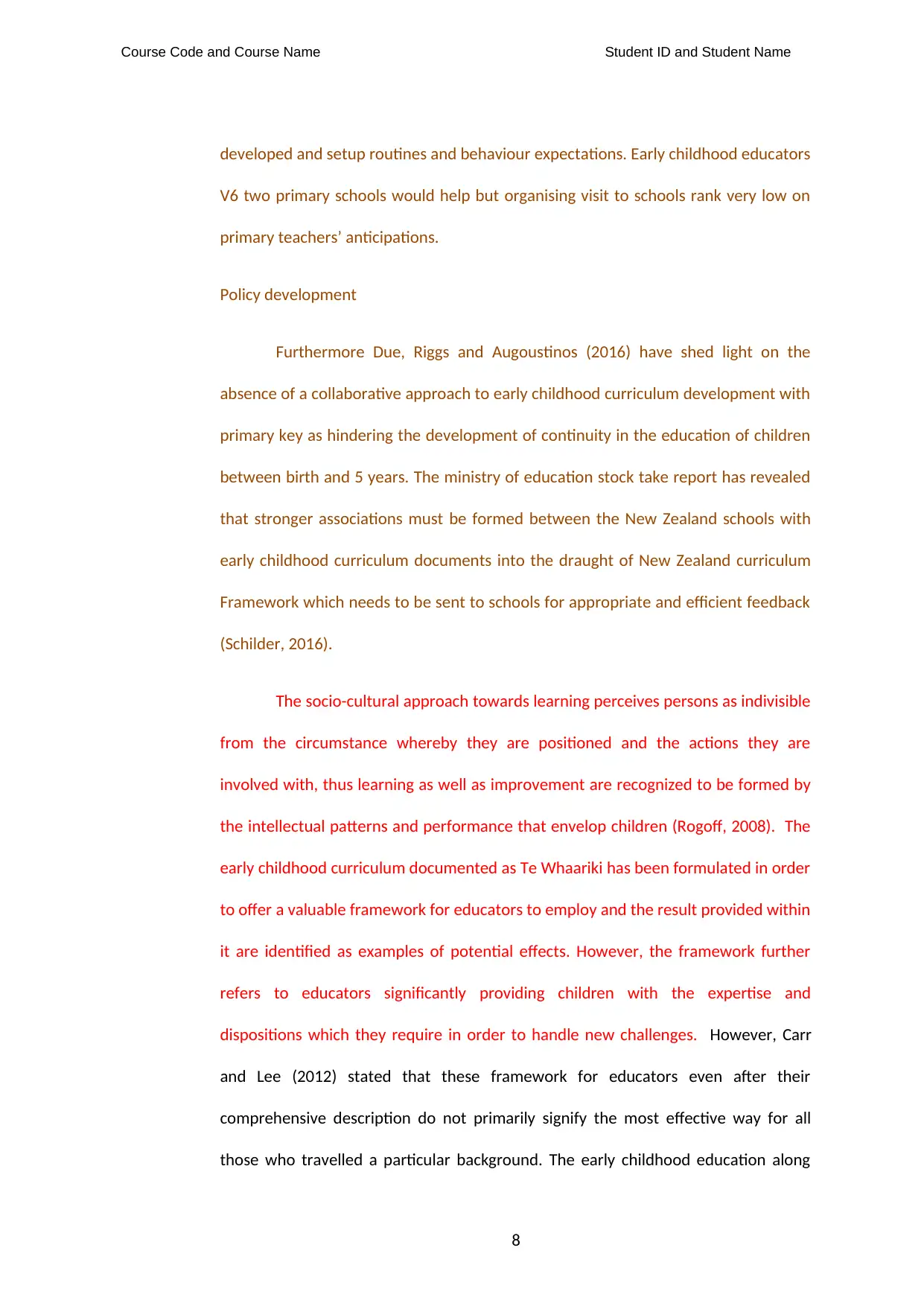
Course Code and Course Name Student ID and Student Name
developed and setup routines and behaviour expectations. Early childhood educators
V6 two primary schools would help but organising visit to schools rank very low on
primary teachers’ anticipations.
Policy development
Furthermore Due, Riggs and Augoustinos (2016) have shed light on the
absence of a collaborative approach to early childhood curriculum development with
primary key as hindering the development of continuity in the education of children
between birth and 5 years. The ministry of education stock take report has revealed
that stronger associations must be formed between the New Zealand schools with
early childhood curriculum documents into the draught of New Zealand curriculum
Framework which needs to be sent to schools for appropriate and efficient feedback
(Schilder, 2016).
The socio-cultural approach towards learning perceives persons as indivisible
from the circumstance whereby they are positioned and the actions they are
involved with, thus learning as well as improvement are recognized to be formed by
the intellectual patterns and performance that envelop children (Rogoff, 2008). The
early childhood curriculum documented as Te Whaariki has been formulated in order
to offer a valuable framework for educators to employ and the result provided within
it are identified as examples of potential effects. However, the framework further
refers to educators significantly providing children with the expertise and
dispositions which they require in order to handle new challenges. However, Carr
and Lee (2012) stated that these framework for educators even after their
comprehensive description do not primarily signify the most effective way for all
those who travelled a particular background. The early childhood education along
8
developed and setup routines and behaviour expectations. Early childhood educators
V6 two primary schools would help but organising visit to schools rank very low on
primary teachers’ anticipations.
Policy development
Furthermore Due, Riggs and Augoustinos (2016) have shed light on the
absence of a collaborative approach to early childhood curriculum development with
primary key as hindering the development of continuity in the education of children
between birth and 5 years. The ministry of education stock take report has revealed
that stronger associations must be formed between the New Zealand schools with
early childhood curriculum documents into the draught of New Zealand curriculum
Framework which needs to be sent to schools for appropriate and efficient feedback
(Schilder, 2016).
The socio-cultural approach towards learning perceives persons as indivisible
from the circumstance whereby they are positioned and the actions they are
involved with, thus learning as well as improvement are recognized to be formed by
the intellectual patterns and performance that envelop children (Rogoff, 2008). The
early childhood curriculum documented as Te Whaariki has been formulated in order
to offer a valuable framework for educators to employ and the result provided within
it are identified as examples of potential effects. However, the framework further
refers to educators significantly providing children with the expertise and
dispositions which they require in order to handle new challenges. However, Carr
and Lee (2012) stated that these framework for educators even after their
comprehensive description do not primarily signify the most effective way for all
those who travelled a particular background. The early childhood education along
8
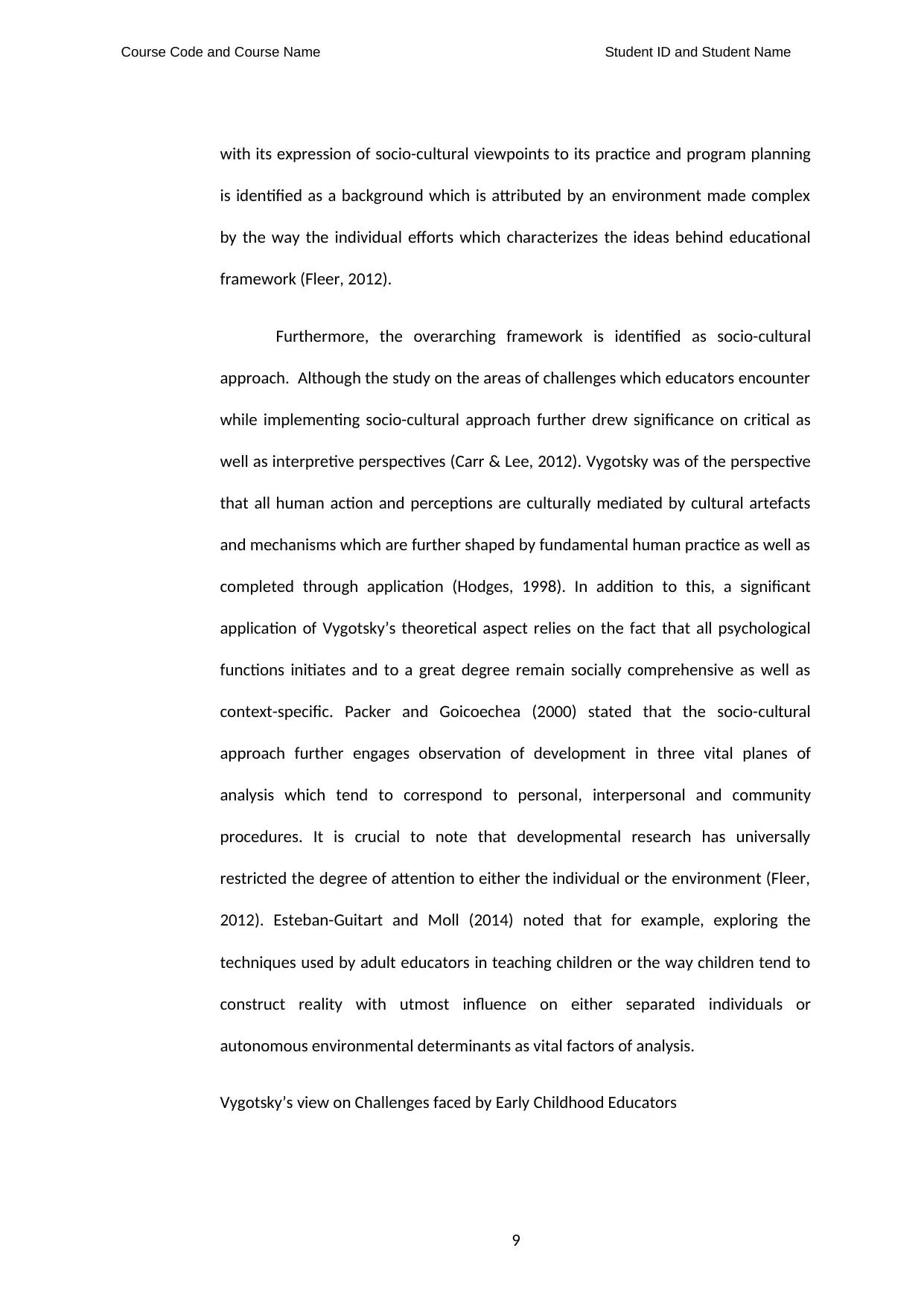
Course Code and Course Name Student ID and Student Name
with its expression of socio-cultural viewpoints to its practice and program planning
is identified as a background which is attributed by an environment made complex
by the way the individual efforts which characterizes the ideas behind educational
framework (Fleer, 2012).
Furthermore, the overarching framework is identified as socio-cultural
approach. Although the study on the areas of challenges which educators encounter
while implementing socio-cultural approach further drew significance on critical as
well as interpretive perspectives (Carr & Lee, 2012). Vygotsky was of the perspective
that all human action and perceptions are culturally mediated by cultural artefacts
and mechanisms which are further shaped by fundamental human practice as well as
completed through application (Hodges, 1998). In addition to this, a significant
application of Vygotsky’s theoretical aspect relies on the fact that all psychological
functions initiates and to a great degree remain socially comprehensive as well as
context-specific. Packer and Goicoechea (2000) stated that the socio-cultural
approach further engages observation of development in three vital planes of
analysis which tend to correspond to personal, interpersonal and community
procedures. It is crucial to note that developmental research has universally
restricted the degree of attention to either the individual or the environment (Fleer,
2012). Esteban-Guitart and Moll (2014) noted that for example, exploring the
techniques used by adult educators in teaching children or the way children tend to
construct reality with utmost influence on either separated individuals or
autonomous environmental determinants as vital factors of analysis.
Vygotsky’s view on Challenges faced by Early Childhood Educators
9
with its expression of socio-cultural viewpoints to its practice and program planning
is identified as a background which is attributed by an environment made complex
by the way the individual efforts which characterizes the ideas behind educational
framework (Fleer, 2012).
Furthermore, the overarching framework is identified as socio-cultural
approach. Although the study on the areas of challenges which educators encounter
while implementing socio-cultural approach further drew significance on critical as
well as interpretive perspectives (Carr & Lee, 2012). Vygotsky was of the perspective
that all human action and perceptions are culturally mediated by cultural artefacts
and mechanisms which are further shaped by fundamental human practice as well as
completed through application (Hodges, 1998). In addition to this, a significant
application of Vygotsky’s theoretical aspect relies on the fact that all psychological
functions initiates and to a great degree remain socially comprehensive as well as
context-specific. Packer and Goicoechea (2000) stated that the socio-cultural
approach further engages observation of development in three vital planes of
analysis which tend to correspond to personal, interpersonal and community
procedures. It is crucial to note that developmental research has universally
restricted the degree of attention to either the individual or the environment (Fleer,
2012). Esteban-Guitart and Moll (2014) noted that for example, exploring the
techniques used by adult educators in teaching children or the way children tend to
construct reality with utmost influence on either separated individuals or
autonomous environmental determinants as vital factors of analysis.
Vygotsky’s view on Challenges faced by Early Childhood Educators
9
⊘ This is a preview!⊘
Do you want full access?
Subscribe today to unlock all pages.

Trusted by 1+ million students worldwide
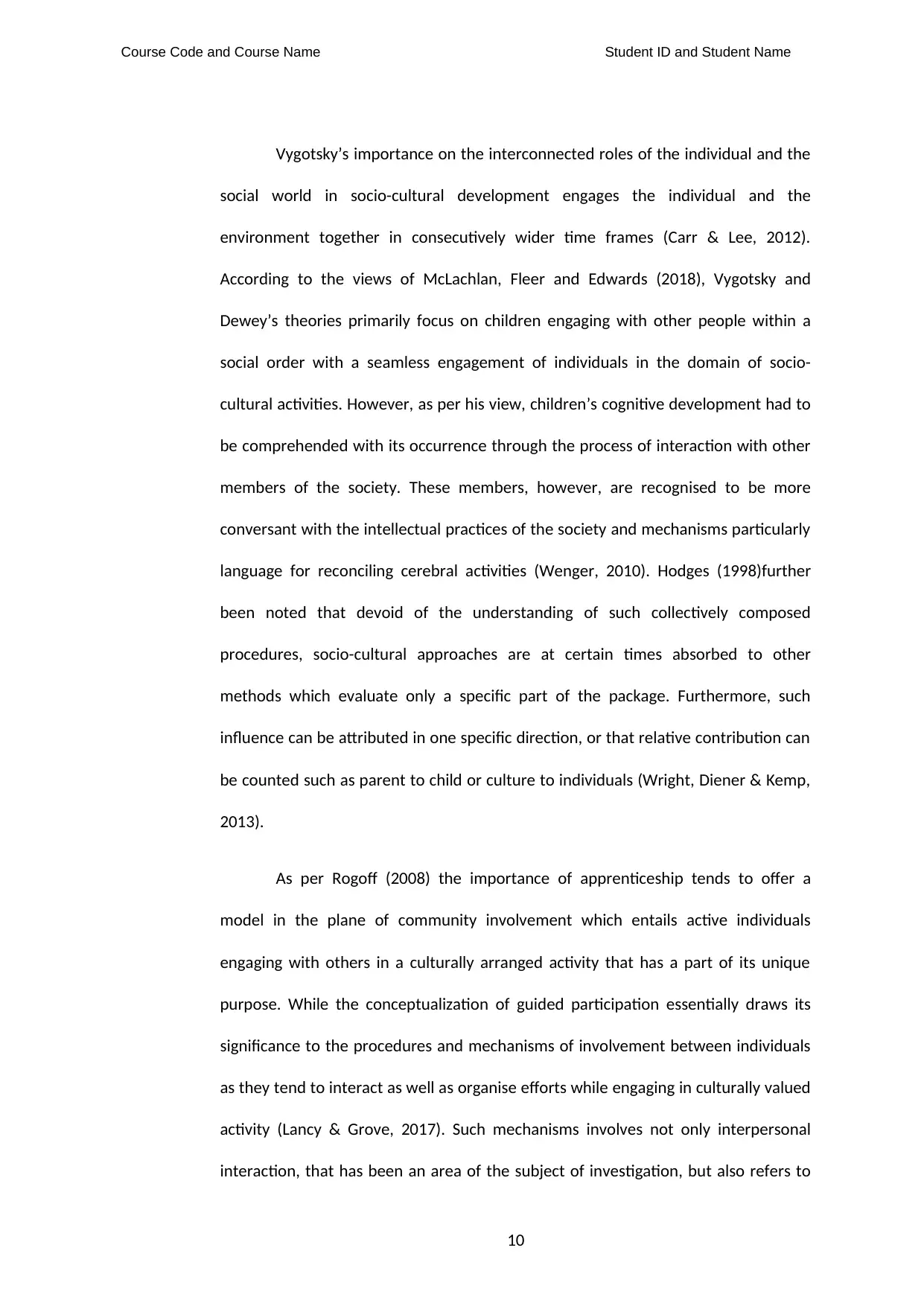
Course Code and Course Name Student ID and Student Name
Vygotsky’s importance on the interconnected roles of the individual and the
social world in socio-cultural development engages the individual and the
environment together in consecutively wider time frames (Carr & Lee, 2012).
According to the views of McLachlan, Fleer and Edwards (2018), Vygotsky and
Dewey’s theories primarily focus on children engaging with other people within a
social order with a seamless engagement of individuals in the domain of socio-
cultural activities. However, as per his view, children’s cognitive development had to
be comprehended with its occurrence through the process of interaction with other
members of the society. These members, however, are recognised to be more
conversant with the intellectual practices of the society and mechanisms particularly
language for reconciling cerebral activities (Wenger, 2010). Hodges (1998)further
been noted that devoid of the understanding of such collectively composed
procedures, socio-cultural approaches are at certain times absorbed to other
methods which evaluate only a specific part of the package. Furthermore, such
influence can be attributed in one specific direction, or that relative contribution can
be counted such as parent to child or culture to individuals (Wright, Diener & Kemp,
2013).
As per Rogoff (2008) the importance of apprenticeship tends to offer a
model in the plane of community involvement which entails active individuals
engaging with others in a culturally arranged activity that has a part of its unique
purpose. While the conceptualization of guided participation essentially draws its
significance to the procedures and mechanisms of involvement between individuals
as they tend to interact as well as organise efforts while engaging in culturally valued
activity (Lancy & Grove, 2017). Such mechanisms involves not only interpersonal
interaction, that has been an area of the subject of investigation, but also refers to
10
Vygotsky’s importance on the interconnected roles of the individual and the
social world in socio-cultural development engages the individual and the
environment together in consecutively wider time frames (Carr & Lee, 2012).
According to the views of McLachlan, Fleer and Edwards (2018), Vygotsky and
Dewey’s theories primarily focus on children engaging with other people within a
social order with a seamless engagement of individuals in the domain of socio-
cultural activities. However, as per his view, children’s cognitive development had to
be comprehended with its occurrence through the process of interaction with other
members of the society. These members, however, are recognised to be more
conversant with the intellectual practices of the society and mechanisms particularly
language for reconciling cerebral activities (Wenger, 2010). Hodges (1998)further
been noted that devoid of the understanding of such collectively composed
procedures, socio-cultural approaches are at certain times absorbed to other
methods which evaluate only a specific part of the package. Furthermore, such
influence can be attributed in one specific direction, or that relative contribution can
be counted such as parent to child or culture to individuals (Wright, Diener & Kemp,
2013).
As per Rogoff (2008) the importance of apprenticeship tends to offer a
model in the plane of community involvement which entails active individuals
engaging with others in a culturally arranged activity that has a part of its unique
purpose. While the conceptualization of guided participation essentially draws its
significance to the procedures and mechanisms of involvement between individuals
as they tend to interact as well as organise efforts while engaging in culturally valued
activity (Lancy & Grove, 2017). Such mechanisms involves not only interpersonal
interaction, that has been an area of the subject of investigation, but also refers to
10
Paraphrase This Document
Need a fresh take? Get an instant paraphrase of this document with our AI Paraphraser
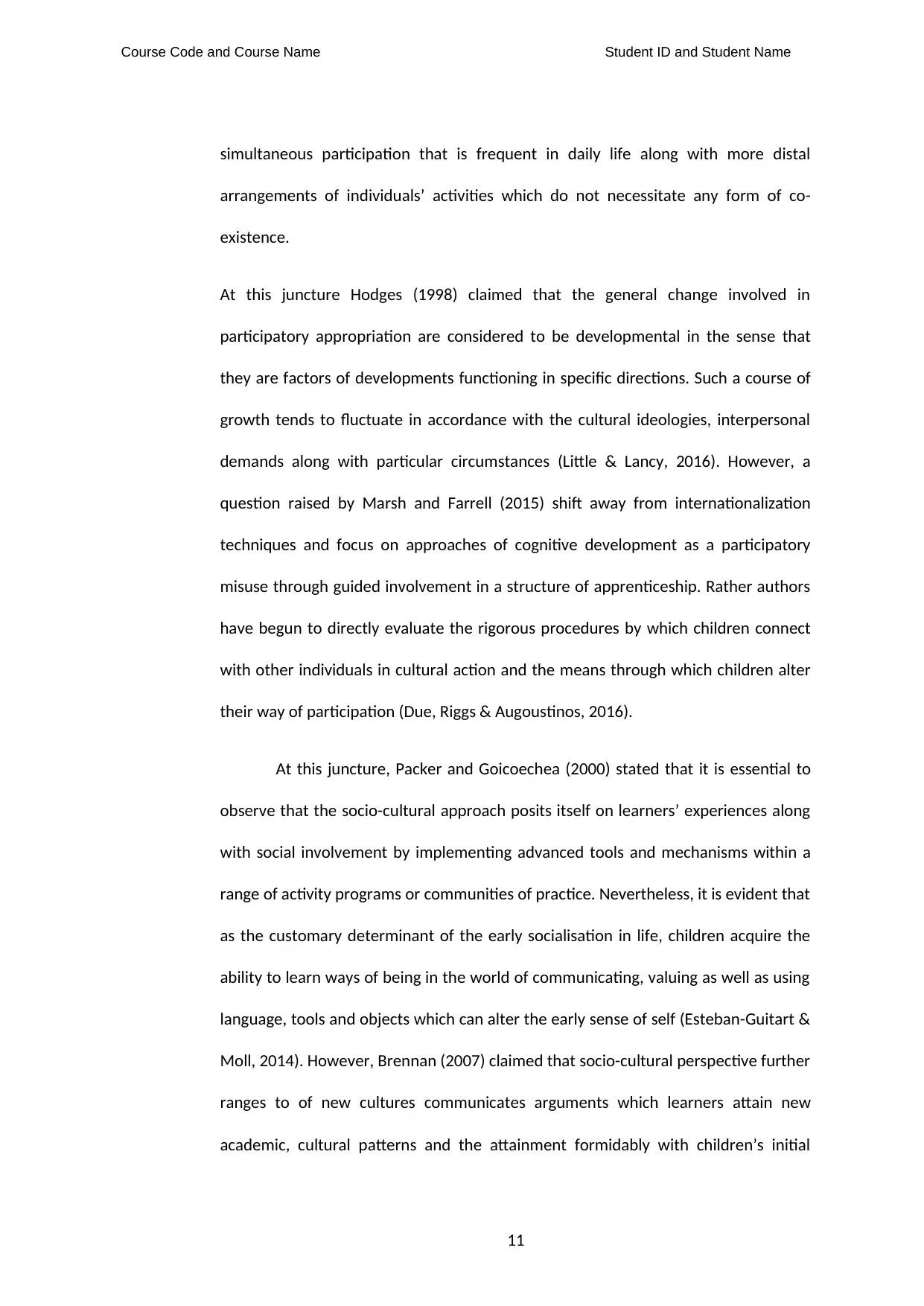
Course Code and Course Name Student ID and Student Name
simultaneous participation that is frequent in daily life along with more distal
arrangements of individuals’ activities which do not necessitate any form of co-
existence.
At this juncture Hodges (1998) claimed that the general change involved in
participatory appropriation are considered to be developmental in the sense that
they are factors of developments functioning in specific directions. Such a course of
growth tends to fluctuate in accordance with the cultural ideologies, interpersonal
demands along with particular circumstances (Little & Lancy, 2016). However, a
question raised by Marsh and Farrell (2015) shift away from internationalization
techniques and focus on approaches of cognitive development as a participatory
misuse through guided involvement in a structure of apprenticeship. Rather authors
have begun to directly evaluate the rigorous procedures by which children connect
with other individuals in cultural action and the means through which children alter
their way of participation (Due, Riggs & Augoustinos, 2016).
At this juncture, Packer and Goicoechea (2000) stated that it is essential to
observe that the socio-cultural approach posits itself on learners’ experiences along
with social involvement by implementing advanced tools and mechanisms within a
range of activity programs or communities of practice. Nevertheless, it is evident that
as the customary determinant of the early socialisation in life, children acquire the
ability to learn ways of being in the world of communicating, valuing as well as using
language, tools and objects which can alter the early sense of self (Esteban-Guitart &
Moll, 2014). However, Brennan (2007) claimed that socio-cultural perspective further
ranges to of new cultures communicates arguments which learners attain new
academic, cultural patterns and the attainment formidably with children’s initial
11
simultaneous participation that is frequent in daily life along with more distal
arrangements of individuals’ activities which do not necessitate any form of co-
existence.
At this juncture Hodges (1998) claimed that the general change involved in
participatory appropriation are considered to be developmental in the sense that
they are factors of developments functioning in specific directions. Such a course of
growth tends to fluctuate in accordance with the cultural ideologies, interpersonal
demands along with particular circumstances (Little & Lancy, 2016). However, a
question raised by Marsh and Farrell (2015) shift away from internationalization
techniques and focus on approaches of cognitive development as a participatory
misuse through guided involvement in a structure of apprenticeship. Rather authors
have begun to directly evaluate the rigorous procedures by which children connect
with other individuals in cultural action and the means through which children alter
their way of participation (Due, Riggs & Augoustinos, 2016).
At this juncture, Packer and Goicoechea (2000) stated that it is essential to
observe that the socio-cultural approach posits itself on learners’ experiences along
with social involvement by implementing advanced tools and mechanisms within a
range of activity programs or communities of practice. Nevertheless, it is evident that
as the customary determinant of the early socialisation in life, children acquire the
ability to learn ways of being in the world of communicating, valuing as well as using
language, tools and objects which can alter the early sense of self (Esteban-Guitart &
Moll, 2014). However, Brennan (2007) claimed that socio-cultural perspective further
ranges to of new cultures communicates arguments which learners attain new
academic, cultural patterns and the attainment formidably with children’s initial
11
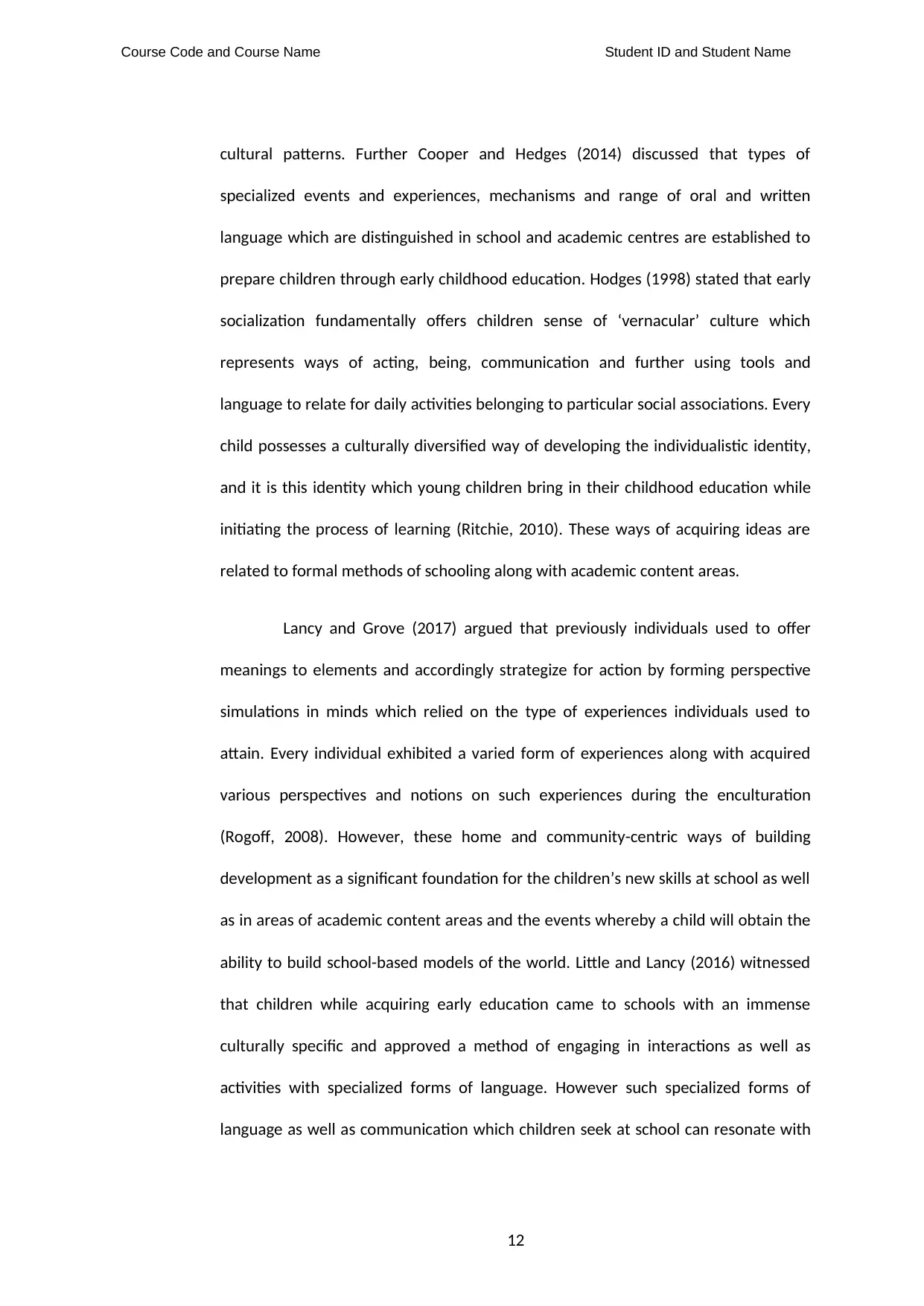
Course Code and Course Name Student ID and Student Name
cultural patterns. Further Cooper and Hedges (2014) discussed that types of
specialized events and experiences, mechanisms and range of oral and written
language which are distinguished in school and academic centres are established to
prepare children through early childhood education. Hodges (1998) stated that early
socialization fundamentally offers children sense of ‘vernacular’ culture which
represents ways of acting, being, communication and further using tools and
language to relate for daily activities belonging to particular social associations. Every
child possesses a culturally diversified way of developing the individualistic identity,
and it is this identity which young children bring in their childhood education while
initiating the process of learning (Ritchie, 2010). These ways of acquiring ideas are
related to formal methods of schooling along with academic content areas.
Lancy and Grove (2017) argued that previously individuals used to offer
meanings to elements and accordingly strategize for action by forming perspective
simulations in minds which relied on the type of experiences individuals used to
attain. Every individual exhibited a varied form of experiences along with acquired
various perspectives and notions on such experiences during the enculturation
(Rogoff, 2008). However, these home and community-centric ways of building
development as a significant foundation for the children’s new skills at school as well
as in areas of academic content areas and the events whereby a child will obtain the
ability to build school-based models of the world. Little and Lancy (2016) witnessed
that children while acquiring early education came to schools with an immense
culturally specific and approved a method of engaging in interactions as well as
activities with specialized forms of language. However such specialized forms of
language as well as communication which children seek at school can resonate with
12
cultural patterns. Further Cooper and Hedges (2014) discussed that types of
specialized events and experiences, mechanisms and range of oral and written
language which are distinguished in school and academic centres are established to
prepare children through early childhood education. Hodges (1998) stated that early
socialization fundamentally offers children sense of ‘vernacular’ culture which
represents ways of acting, being, communication and further using tools and
language to relate for daily activities belonging to particular social associations. Every
child possesses a culturally diversified way of developing the individualistic identity,
and it is this identity which young children bring in their childhood education while
initiating the process of learning (Ritchie, 2010). These ways of acquiring ideas are
related to formal methods of schooling along with academic content areas.
Lancy and Grove (2017) argued that previously individuals used to offer
meanings to elements and accordingly strategize for action by forming perspective
simulations in minds which relied on the type of experiences individuals used to
attain. Every individual exhibited a varied form of experiences along with acquired
various perspectives and notions on such experiences during the enculturation
(Rogoff, 2008). However, these home and community-centric ways of building
development as a significant foundation for the children’s new skills at school as well
as in areas of academic content areas and the events whereby a child will obtain the
ability to build school-based models of the world. Little and Lancy (2016) witnessed
that children while acquiring early education came to schools with an immense
culturally specific and approved a method of engaging in interactions as well as
activities with specialized forms of language. However such specialized forms of
language as well as communication which children seek at school can resonate with
12
⊘ This is a preview!⊘
Do you want full access?
Subscribe today to unlock all pages.

Trusted by 1+ million students worldwide
1 out of 19
Related Documents
Your All-in-One AI-Powered Toolkit for Academic Success.
+13062052269
info@desklib.com
Available 24*7 on WhatsApp / Email
![[object Object]](/_next/static/media/star-bottom.7253800d.svg)
Unlock your academic potential
Copyright © 2020–2026 A2Z Services. All Rights Reserved. Developed and managed by ZUCOL.





